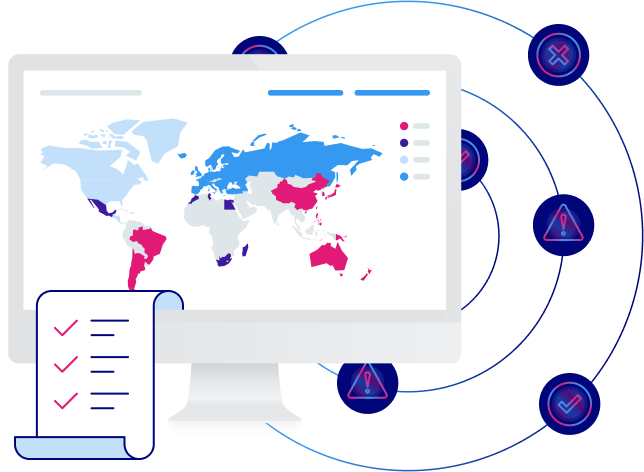-
Solutions
- AI Governance
- AI Risk
- Geo-Specific Cookie Banner
- Consumer Preference Management
- Data Subject Request Automation
- Data Mapping and Vendor Risk Management
- Migrate
- Privacy, Vendor, and Risk Assessments
- Privacy Program Management
- Regulatory Guidance
- Privacy Program Consulting
- Certifications and Verifications
- International Data Transfers
Forrester TEI ROI of Privacy ReportTrustArc commissioned a Forrester study to analyze the potential benefits of using our platform and the Forrester team found ROI linked to efficiency, compliance, and decreased cost in data breaches.
Read the report -
Products Products Privacy Studio Overview
Automate consent and data subject rights compliance. Design seamless privacy experiences to enhance customer trust across your digital landscape.
- Cookie Consent Manager Effortlessly manage cookie consent for global compliance, ensuring a secure, personalized browsing experience.
- Consent & Preference Manager Easily manage and orchestrate customer consent and preferences across brands and channels.
- Individual Rights Manager Automate and streamline DSR workflows to ensure compliance and show your commitment to customer rights.
- Trust Center Centralize policies, disclosures, and trust-building information in a customizable no-code hub that speeds up deals.
Products Governance Suite OverviewStay ahead of privacy and compliance regulations. Simplify data privacy management and ensure data governance with cutting-edge apps.
- PrivacyCentral Centralize privacy tasks, automate your program, and seamlessly align with laws and regulations.
- Data Mapping & Risk Manager Gain full visibility and control of your data and accurately identify and mitigate risks.
- Assessment Manager Automate and score privacy assessments like PIAs and AI Risk, streamlining your compliance workflow.
- Nymity Research Get instant access to the latest in privacy regulations, legal summaries, and operational templates.
Products Assurance Services OverviewGain trust and credibility with leading privacy certifications from unbiased experts, backed by technology for unmatched privacy compliance assurance.
- Dispute Resolution
- TRUSTe Global CBPR and PRP Certification
- Data Privacy Framework Verification
- TRUSTe APEC CBPR and PRP Certification
- TRUSTe Responsible AI Certification
- TRUSTe Enterprise Privacy Certification
- CCPA/CPRA Validation
- GDPR Validation
- TRUSTe Data Collection Certification
- TRUSTe EDAA Privacy Certification
- Digital Advertising Alliance Validation
-
Regulations
- EU General Data Protection Regulation (GDPR)
- California Consumer Privacy Act (CCPA)
- Virginia Consumer Data Protection Act (CDPA)
- NIST AI Framework
- ISO/IEC 27001
EU Artificial Intelligence Act (EU AI Act)EU's regulation on the use of AI and the world's first comprehensive AI law.
Learn moreData Privacy Framework (DPF)Transatlantic data transfer mechanism for EU-U.S., UK, and Swiss-U.S. commerce.
Learn more - Resources
- Contact us
Data Privacy Framework (DPF)
The EU-U.S. DPF, UK Extension to the EU-U.S. DPF, and Swiss-U.S. DPF was developed by the U.S. Department of Commerce and the European Commission, UK Government, and Swiss Federal Administration to provide U.S. organizations with reliable mechanisms for personal data transfers to the United States from the European Union, United Kingdom, and Switzerland while ensuring data protection that is consistent with EU, UK and Swiss law.
Who is eligible to participate in the DPF Program?
To be eligible to participate in the DPF, an organization must be subject to the investigatory and enforcement powers of the Federal Trade Commission (FTC) or the U.S. Department of Transportation (DoT).
The FTC’s jurisdiction covers acts or practices in or affecting commerce by any “person, partnership, or corporation.” The FTC does not have jurisdiction over most depository institutions (banks, federal credit unions, and savings & loan institutions), telecommunications, interstate transportation, common carrier activities, air carriers, labor associations, most non-profit organizations, and most packer and stockyard activities.
Key obligations under the Data Privacy Framework
Purpose limitation & choice
Personal data should be processed lawfully and fairly. It should be collected for a specified purpose and should not be processed in a way that is incompatible with the purpose for which it was originally collected or authorized by the individual.
Provide data subjects with a mechanism to exercise choice in relation to the use or disclosure of their personal information.
Policies & notices
Data subjects should be informed of the main features of the processing of their personal data. Provide clear and conspicuous notice(s) about the practices and policies that govern the personal information.
The Privacy Notice must inform individuals of the organization’s participation in the EU-U.S. DPF and, as applicable the UK Extension to the EU-U.S. DPF, and/or the Swiss-U.S. Data Privacy Framework (Swiss-U.S. DPF) and provide a link to, or the web address for, the Data Privacy Framework List.
Data subject rights & requests
Data subjects should have certain rights which can be enforced against the controller or processor, in particular the right of access to data, the right to object to the processing and the right to have data rectified and erased.
Sub-processing
In the case of sub-processing, a processor must conclude a contract with the sub-processor guaranteeing the same level of protection as provided by the DPF Principles and take steps to ensure its proper implementation.
Accountability for onward transfers
To transfer personal data to a third party acting as a controller, the organizations must execute a contract requiring them to apply the same level of protection, use the data for specified purposes, and notify if they cannot meet their obligations under the DPF.
To transfer personal data to a third party acting as an agent, the organization must transfer such data only for limited and specified purposes. Contracts must be in place with processors requiring them to provide the same level of privacy protections, ensure that the agent effectively processes the personal data transferred in a manner consistent with the organization’s obligations under the DPF, notify the controller if it can no longer meet its requirements, upon notice of unauthorized processing, the processor must take reasonable and appropriate steps to stop and remediate the unauthorized processing.

Achieve compliance
-
Reputation and trust Enhance your reputation and trust with a verified seal. Our experts can review compliance for customer data, employee data, or both to achieve certification easily and quickly.
-
Dispute resolution service Easily fulfill your independent recourse mechanism obligation with TRUSTe. Reduce your risk and let a trusted third party handle it.

The information provided does not, and is not intended to, constitute legal advice. Instead, all information, content, and materials presented are for general informational purposes only.




